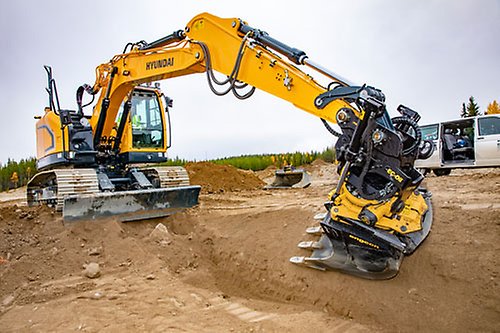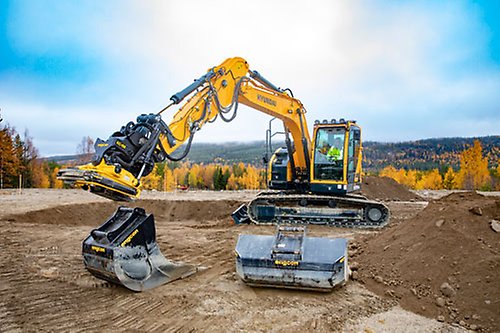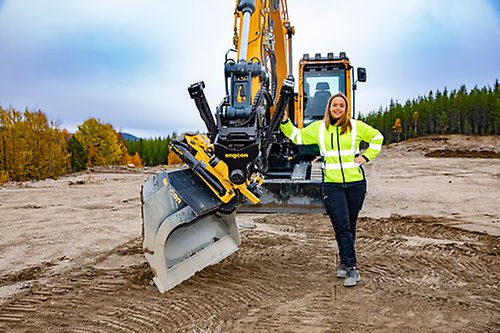”Safety is the most important thing we teach our students”
As equipment becomes increasingly advanced and the need for operators grows, equipment operator training becomes all the more important. Every year, 30 students and 25 adult students in the town of Bräcke in Jämtland County, Sweden, begin a three-year training programme covering track and wheel-driven excavators, backhoe loaders and wheel loaders.
Extra training is also available on dump trucks, graders and lorries. With almost 100 acres of land on which to practice digging and excavating, the place counts as one of Sweden’s biggest training facilities. ”There is an urgent need for operators and we often get direct requests for them from contractors as we approach graduation,” says Ingemar Salomonsson, Director of Heavy Equipment Operator Training at Jämtland’s Vocational College. Ingemar shows us around the extensive grounds, which are a hive of activity. No fewer than 30 different operations must be completed and approved one after the other before students may move on to the next stage. This means everything from road construction, electrical trenching, laying foundations and safe lifting. Studies alternate between theory and practical exercises, which also include pre-driving checks, lubrication and training in light maintenance and repairs.
Safety is paramount
”No matter how good students are on the different machines and the operations they must perform, there is one thing that’s even more important, and it’s spelled S-A-F-E-T-Y,” says Ingemar, as he shows me around the area. Ingemar explains that training begins by teaching students what the risks are, how to avoid them and what they must bear in mind both inside and outside the machine. ”We’re dealing with heavy machinery and equipment, and one small mistake can have dire consequences,” says Ingemar. We stop next to an almost new Hyundai HX145LCR operated by Sanna Fredin, an adult education student. She’s practicing excavating for a foundation and is finishing off digging out for the edge beam. She tells us she’d worked for a few years as a substitute in a kindergarten in her hometown of Gällö, that she grew tired of it and wanted to try something entirely different and more hands-on. ”That’s right, and what’s more I’ve heard about the great demand for excavator operators, so I’m confidently hoping to get a job once I finish training,” says Sanna.
I’d like to see QSC on every excavator
Sanna talks a little about how she learns to plan work on the building foundation, how important it is for the machine to be positioned correctly and that everything is done safely both for her and her colleagues around the machine. This got us talking about safety and how this particular machine is fitted with the world’s safest quick hitch, the engcon Q-Safe and the QSC lock system. ”I’m a great fan of QSC as it makes connecting and disconnecting buckets easy. As an operator, the fact that the bucket lock cannot be opened while the bucket is off the ground, and that the system alerts us and makes it impossible to slew the machine with incorrectly connected tools, I get a great sense of extra safety,” says Sanna. Things go quickly and smoothly when Sanna switches a tooth bucket for a grading bucket and she also shows us how she uses the QSC lock panel in the cab. ”Because all of the machines on the training grounds have different ways of opening and locking the quick hitch, things would be simpler if all of the excavators here had QSC. And safer too, naturally,” she concludes, before it’s time for lunch.
Striving for the latest, safest technology
We end the day with a round table discussion in the staff room where interesting opinions are aired about how the school’s machines are equipped. It varies depending on whether new or used equipment is purchased. ”In the case of brand new machines, we naturally do our best to equip them with the latest, safest technology,” says Ingemar. Something that his colleagues – instructors Erik Edenström and Anders Festin along with Service and Maintenance Manager Andreas Olausson – wholeheartedly agree on. ”Naturally, we have to ensure that our students are prepared as far as possible for the things they’ll meet in the real world,” is the unanimous conclusion of the round table discussion, before we finish lunch and it’s time for the students to get back to work again. I see in my car’s rear-view mirror how several of the machines are once again in full swing out in the field, and when it’s time for graduation, Jämtland’s Vocational College will be able to offer the construction industry another 55 trained machine operators.

"I’m a great fan of QSC as it makes connecting and disconnecting buckets easy. As an operator, the fact that the bucket lock cannot be opened while the bucket is off the ground, and that the system alerts us and makes it impossible to slew the machine with incorrectly connected tools, I get a great sense of extra safety."
Sanna Fredin
404 - Page not found
We couldn't find the page you're looking for.
An error has occurred
Try downloading the page again to see if the error recurs.
An error has occurred
We could not connect you to the Internet


